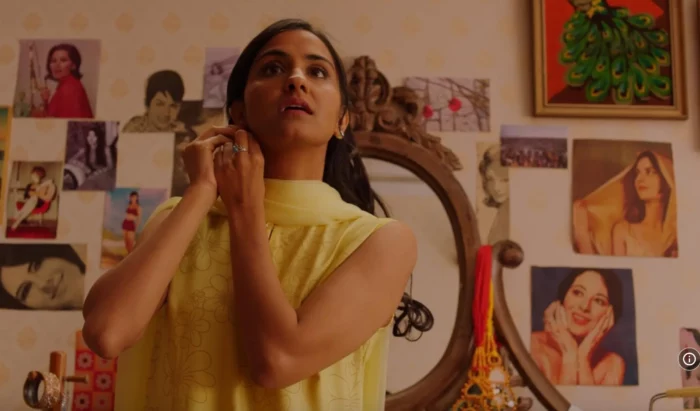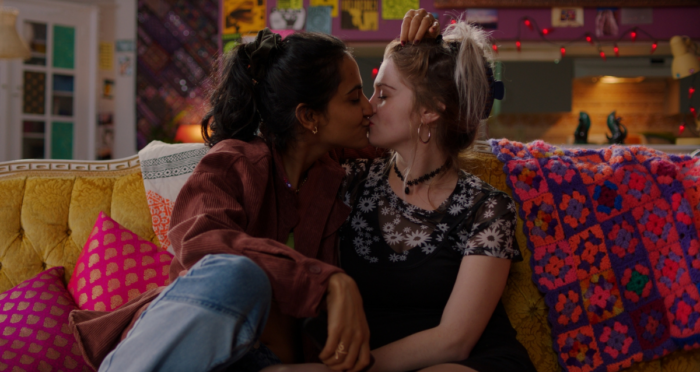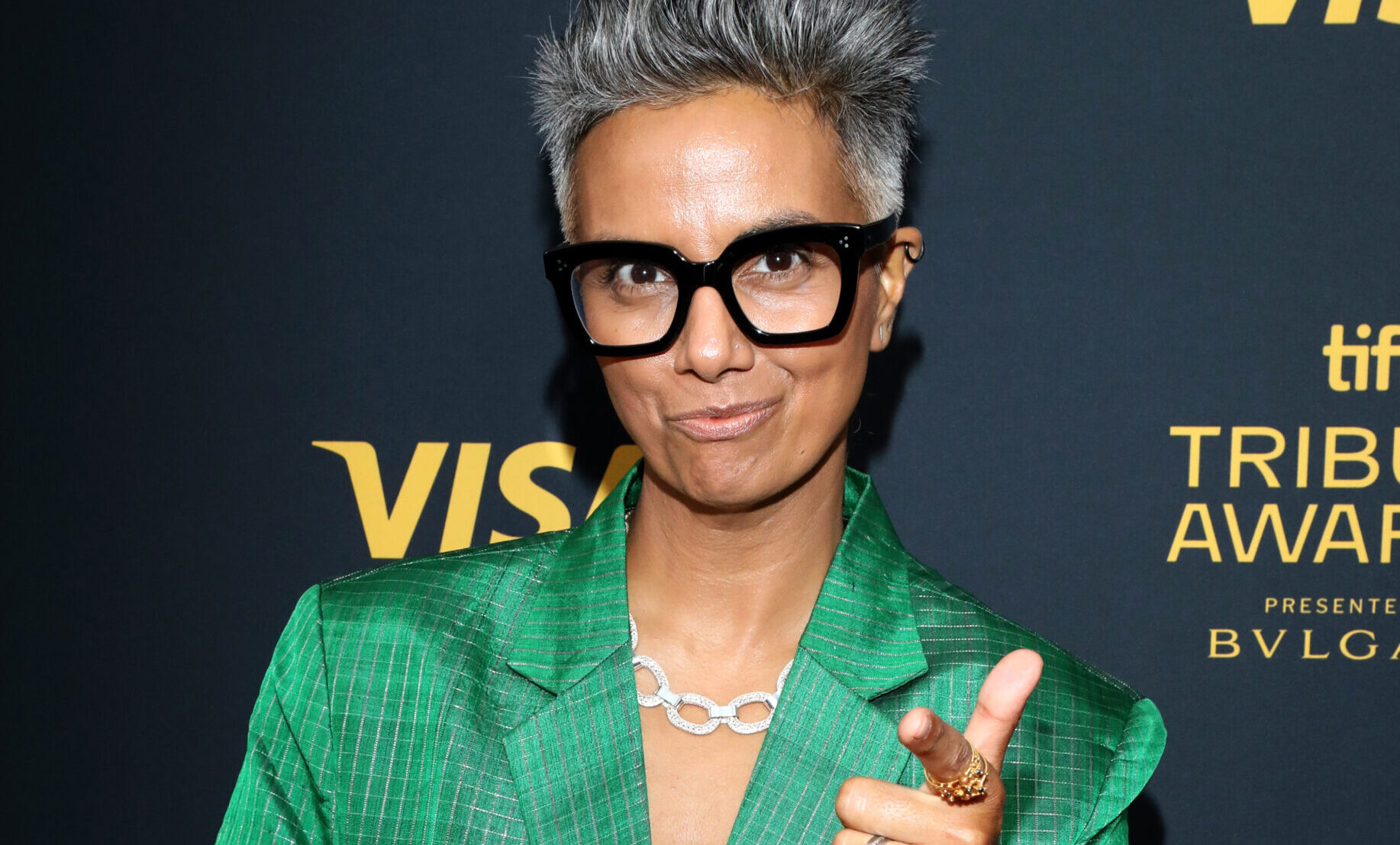As the opening night gala presentation of this year’s Reel Asian International Film Festival, after having already made a splash at the Toronto International Film Festival in September, The Queen of My Dreams, written and directed by Fawzia Mirza, feels like a first.
Set and shot in Canada and Pakistan, it’s a queer coming-of-age tale and love story we rarely get to see from the brown perspective, told with a personal touch by Mirza, who adapted her own short film.
The cast is one you’re sure to recognize, as it stars Amrit Kaur (The Sex Lives of College Girls), Hamza Haq (Transplant), and iconic Pakistani actress Nimra Bucha (Ms. Marvel, Polite Society).

The film tells the story of Azra (Kaur), a young Pakistani Canadian woman who has had a strained relationship with her mother Mariam (Bucha) since coming out as gay. But after her father Hassan (Haq) unexpectedly dies, Azra goes on an emotional journey and begins to better understand her mother and her parents’ past.
Mirza’s impressive screenplay jumps from present day in 1999 to 1969, when Mariam was growing up in Nova Scotia. In flashbacks, Kaur plays a young Bucha, while Haq remains himself all throughout (with a little extra aging makeup for the ’90s). It’s reminiscent of the way South Asian films often feature actors in double roles.

What connects mother and daughter more than anything is their mutual love of beautiful Bollywood legend Sharmila Tagore, the beloved 1969 movie Aradhana in which she starred with Rajesh Khanna, and its signature song “Mere Sapno Ki Rani” (“queen of my dreams”), performed by none other than Kishore Kumar.
The idea for the story came to Mirza over 10 years ago. She explains, “I was struggling to reconcile my identities about whether I could be queer and be a good Muslim and love Bollywood romance all at the same time. After having that very internal struggle, I found a very public way of dealing with it, which was to make art in order to find the answer.”
“That’s how I became an artist — writing out of need to see stories that represented myself, my communities, and our stories as queer Muslim people of colour, because there were none. I write everything I do…it’s always personal.”
Fawzia Mirza
That’s how the short film was born, in 2012, and how Mirza learned that, yes, she can be all of those things at once. She also discovered that the film had a major impact on audiences, as it represented a community that is so rarely seen on screen. Because she didn’t quite consider herself a filmmaker at the time, and was still trying to make it as an actor, Mirza decided to do a one-woman show, called Me, My Mom and Sharmila Tagore. She performed it in Chicago (where she also developed it), around the U.S., and even in Pakistan. That eventually motivated her to develop it into a feature.
“That’s how I became an artist — writing out of need to see stories that represented myself, my communities, and our stories as queer Muslim people of colour, because there were none. I write everything I do…it’s always personal,” she says.
So if you’re curious, yes, like Miriam, Mirza also grew up in Nova Scotia. Specifically, Sydney in Cape Breton Island where, perhaps unsurprisingly, the South Asian community is relatively small and, in Mirza’s words, “isolating.” Her father worked as a physician, and “you go where you can get a job,” so that meant the island.
Mirza found connection with her culture by watching Bollywood films. They also inspired her need to tell stories, as she shares, “I’m a Pisces, I’m a romantic, I love fantasy and romance. So maybe I was inherently going to be pulled to rom-coms anyway, but Bollywood really spoke to me about what love is, what love could be, the grandeur and the hope of it all.”
“My intent of making this is… about centring love, hope, and possibility and…sharing a window into a world that is hopeful. I think of love and compassion as acts of resistance.”
Fawzia Mirza
Despite how much The Queen of My Dreams was inspired by her relationship with her mother, Mirza says she hasn’t watched the film, and might not ever watch it. But it’s not a cause for concern. Mirza explains, “My intent of making this is less about my family watching it, and more about centring love, hope, and possibility and…sharing a window into a world that is hopeful. I think of love and compassion as acts of resistance.”
In starring an LGBT character, and exploring themes of strained parent-child relationships, grief and death, and falling in love and coming of age, The Queen of My Dreams is a progressive addition to Pakistan’s film catalogue. It’s also a massively assured feature debut from Mirza. Partly because of just how complex the narrative is, as it’s told through two lenses and two timelines, and has been adapted from a short and a play.

Mirza shared that she’s been working on the script since 2017, and taken it through rewrite after rewrite. She even originally had a co-writer, and was rewriting right up until shooting certain scenes. She says finding financing was “just as challenging as it might be for any film,” but what helped was having her wife, Andrea, as co-producer, and who was the first to join the team — naturally.
“As soon as I committed and we got married, everything in my life has been better,” says Mirza, the smile evident in her voice. “Her presence in my life as a romantic partner is incredible, but as a creative collaborator, she’s made me better as a creative person.”
Then, of course, there’s the cast. Kaur auditioned, and had an immediate “spark” that spoke to Miriam, while Mirza had known Haq for some time, sent him the script, and he fell in love. The acting pair had worked together before — and share and acting coach — so chemistry was on lock. As for Bucha, “an icon,” Mirza said they both felt like they’d known each other for years when they first met over Zoom, and that struck an instant bond.

In some interesting local trivia, Ayana Manji, who plays young Mariam, is the daughter of actor Rizwan Manji (Schitt’s Creek, Zarqa, Shazam). Mirza knew he had a child the right age, and just phoned him up, and everyone got together. All of which is to say, the team behind the film were very much a family.
If you didn’t catch The Queen of My Dreams at Reel Asian or TIFF, it’ll be hitting theatres in early 2024, via Cineplex Pictures. As for whether it will screen in Pakistan? Mirza says she’d love to see it happen, and she’s “sure it will.” Stay tuned.
Fresh off the writer’s strike, Mirza’s working away on a number of projects, for film and television, nothing she can share just yet. But right now, she’s still feeling the glow of The Queen of My Dreams.
“It’s my first feature as a director, so you don’t know what an audience is going to feel or experience,” she says. “It’s been emotionally rewarding, gratifying, and magical to wear my Piscean heart on my sleeves and make a thing that truly centres love and to be matched with love from audiences. To know I’m making an impact through personal storytelling? That’s the good stuff.”
Like this post? Follow The RepresentASIAN Project on Instagram, TikTok and YouTube to keep updated on the latest content.











